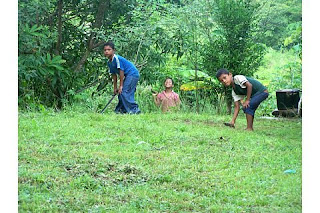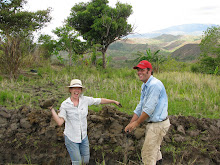
Megan's flat Stanley cooking with Joel
I have been at “Technical Week” this last week of May, helping with the new group of agriculture volunteers that arrived mid April. It is quite a reminder of the changes that I have gone through. First of all language, everyone asks if I am fluent yet….well I think I might achieve that my next Peace Corps service (some days I think I could do this all over again) but I understand. I think I have been able to take advantage of this tech week a hell of a lot more than my first time around, only because I understand the Spanish (it isn’t campo Spanish that makes it easier). The other change I get emotional taking about the difficulties related to development work here in Panama. When I hear from the director of the Ag. School that during the 40 years that he has been working as an ag. Extensionist not really anything has changed and he says the country is in Agricultural crisis. What the hell can I do??? I am not really sure but maybe I can learn to play some good music. Oh yeah the changes….the food here at the ag school, I remember being pretty bad and these new volunteers say just the same. I am thinking damn this is good , one than two things on my plate and at least one of them has flavor (that doesn’t count what we cook for ourselves – although that can get boring sometimes too).

Tech week female and male fish parts

Malaysian shrimp with eggs


We harvested this little guy from a fish tank. Only bites a little.
Isaac and I are taking up our own rice planting. We have borrowed a rice tank from a friend who doesn’t really grow food any more (he runs the best managed store – of the 5 in the town of 200). He makes enough food so that he doesn’t need to grow food. We have divided into three small easily managed parts and are going to practice what we preach. So far we have made new enemies with the leaf cutter ants. We learned our lesson about this so called arriera (leaf cutter ant) killer canavalia. It is best that this nitrogen fixing plant sticks to nitrogen fixing and we take other measures to save the beans for the umpthtilionth time from this voracious eater. Our compost pile is sinking and we have just a few more weeks to wait to us it. There is a delicious mango tree nearby, mango guayaba, it tastes something like a sour apple jolly rancher. And the other tree has some loud baring branches with, mama llena mangos (full mother mango), a fruit that is larger than a soft ball.

Roasting cashews with Jhony

The boat ride on the canal with my folks

mom and dad's ride up to La Chumicosa
The season started with the marañon (cashew) that we roasted when my parents were here. My mom’s doctor in the states identified her strange stomach rash as a virus that she picked up in Panama. I am pretty sure that was the smoke from roasting the nuts. They are in the same family as Poison Ivy and leach a super flammable oil that ignites to finish charring the shell of the nut so that you can get to the nut. Right now we have mangos and next to grace our chicha glasses is Nance, a tiny yellow fruit the size of a pencil eraser with the initial flavor of something a bit rotten yet sweet and greasy. You have to learn to like that one (Isaac still doesn’t like it), I can’t wait! Anything not not drink double sugared koolaid.













